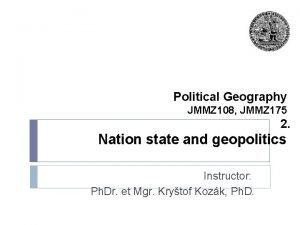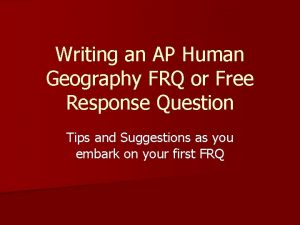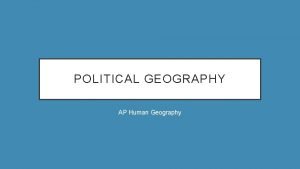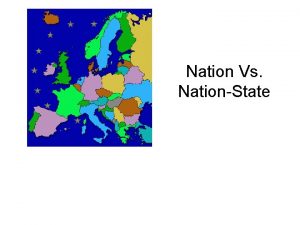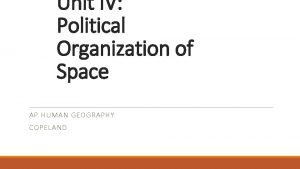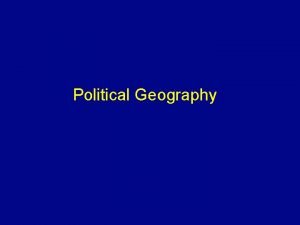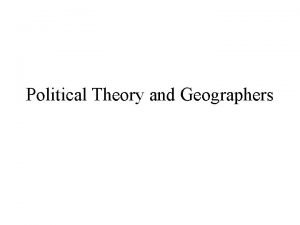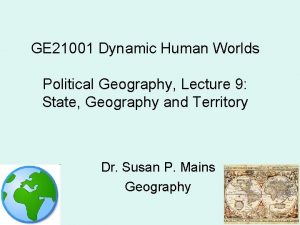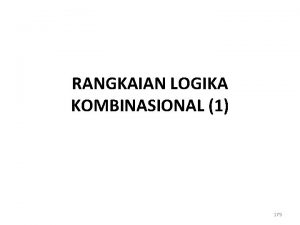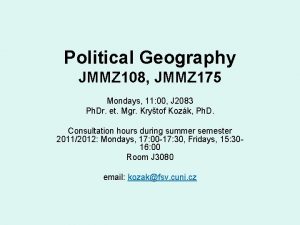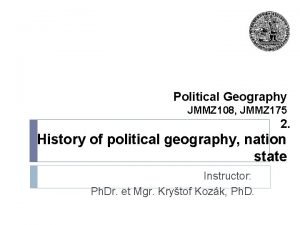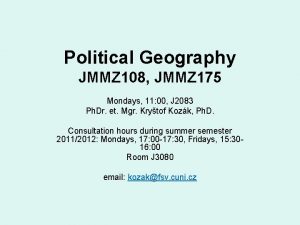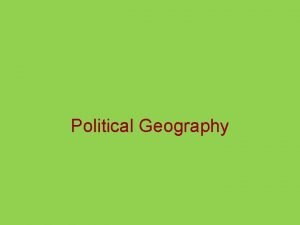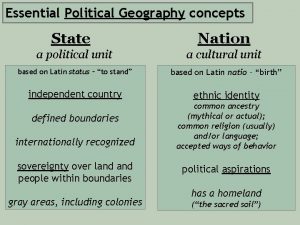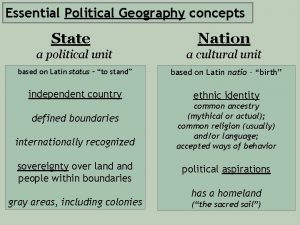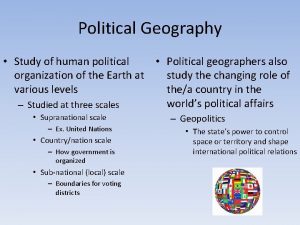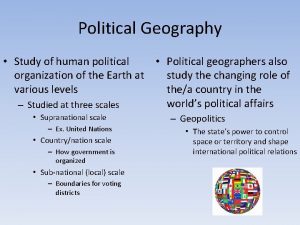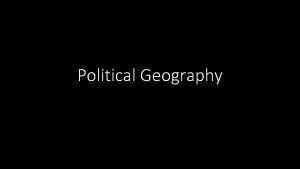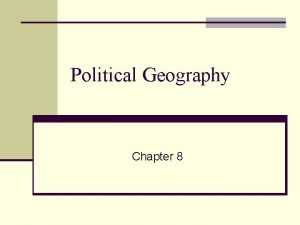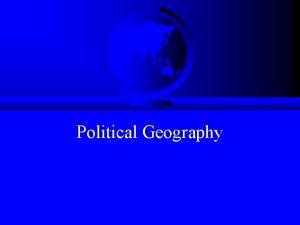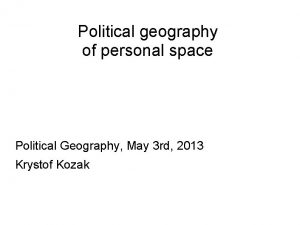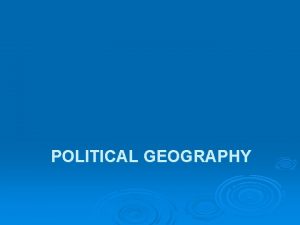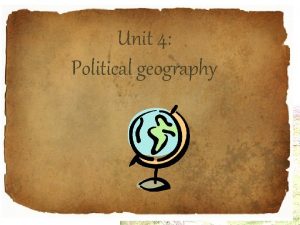Political Geography JMMZ 108 JMMZ 175 2 Nation





















- Slides: 21

Political Geography JMMZ 108, JMMZ 175 2. Nation state and geopolitics Instructor: Ph. Dr. et Mgr. Kryštof Kozák, Ph. D.

Geography and the projection of power: Geopolitics Alfred Thayer Mahan (US) (1840 - 1914) The Influence of Sea Power upon History, 1660 -1783 Sea power more important than land power Implications: United States need a stronger navy

Battle of Trafalgar, 1805

Continental blockade (Napoleonic Wars), 18061814

Today: Zumwalt class destroyer 1 nmi = 1, 852 km

Geopolitics- Angloamerican school Halford John Mackinder (18611947) 1904 "The Geographical Pivot of History“ Heartland Theory Who rules East Europe commands the Heartland; who rules the Heartland commands the world-island; who rules the world-island controls the world. "

Geopolitics: Angloamerican school

Geopolitics: Angloamericans - Nicholas J. Spykman (1893 -1943) Who controls the rimland rules Eurasia; Who rules Eurasia controls the destinies of the world. Eurasian struggle was not the sea powers containing the heartland, but the prevention of any power from ruling the rimland. Geographic determinism: „Since geography was "the most fundamentally conditioning factor because of its relative permanence, " it was of primary relevance in analyzing a state's potential foreign policy. ”

Geopolitics – German school Friedrich Ratzel (1844 -1904) Organic theory of the state: - social derwinism - 1897 Politische - international politics as struggle for survival, states either rise or decline - importance of territory for the rise of the state lebensraum


Geopolitics – German school Johan Rudolf Kjellén (1864 - 1922) The State as a Living Form, 1916 Five key concepts that would shape German geopolitik: - Reich was a territorial concept that was comprised of Raum (Lebensraum), and strategic military shape; - Volk was a racial conception of the state; - Haushalt was a call for autarky based on land, formulated in reaction to the vicissitudes of international markets; - Gesellschaft was the social aspect of a nation’s organization and cultural appeal, Kjellén anthropomorphizing inter-state relations more than Ratzel had; and, - Regierung was the form of government whose bureaucracy and army would contribute to the people’s pacification and coordination.

Geopolitics – German school Karl Haushofer, (1869 - 1946) Geopolitics is "the duty to safeguard the right to the soil, to the land in the widest sense, not only the land within the frontiers of the Reich, but the right to the more extensive Volk and cultural lands“ „the existence of a state depends on living space, the pursuit of which must serve as the basis for all policies“

1942

Geopolitics – German school Geopolitik contributed to Nazi foreign policy chiefly in the strategy and justifications for lebensraum. The theories contributed five ideas to German foreign policy in the interwar period: the organic state; lebensraum; autarky; pan-regions; and the land power/sea power dichotomy.

German vs. Angloamerican school Lebensraum vs. colonial imperialism; Autarky vs. tariff protectionism (imperial system); Strategic control of key geographic territories exhibiting the same thought behind earlier designs on the Suez and Panama canals; and Pan-regions (Panideen) based upon the British Empire, and the American Monroe Doctrine, Pan. American Union and hemispheric defense.

World War 1914 -1945



Plány po německém vítězství

World War 1914 -1945 1914 -1918 Entente: Dead: 5, 520, 000 Wounded: 12, 831, 000 Missing: 4, 121, 000 Triple Alliance: Dead: 4, 386, 000 Wounded: 8, 388, 000 Missing: 3, 629, 000 1939 -1945 Allies: Military casualties: 17, 000 Civilian causalties: 33, 000 Total (cca): 50, 000 Axis: Military casualties: 8, 000 Civilian Casualties: 4, 000 Total (cca): 12, 000

Transformation of the perception of war, geopolitics as one of the culprits?
 Obtuse
Obtuse Pvifa equation
Pvifa equation Angloamericans
Angloamericans Ap human geography frq format
Ap human geography frq format Proruption ap human geography
Proruption ap human geography State vs nation
State vs nation Nation vs nation state
Nation vs nation state Example of nation
Example of nation Stateless nation ap human geography
Stateless nation ap human geography Elongated state in africa
Elongated state in africa Centrifugal force definition geography
Centrifugal force definition geography Classification of boundaries in political geography
Classification of boundaries in political geography Boundaries ap human geography
Boundaries ap human geography Map of europe 1990
Map of europe 1990 Objectives of political geography
Objectives of political geography Compare geometric boundaries and antecedent boundaries.
Compare geometric boundaries and antecedent boundaries. Population density map australia
Population density map australia Political geography
Political geography Relationship between political science and geography
Relationship between political science and geography 175 =
175 = 186-175
186-175 Look at the pictures and answer the
Look at the pictures and answer the


